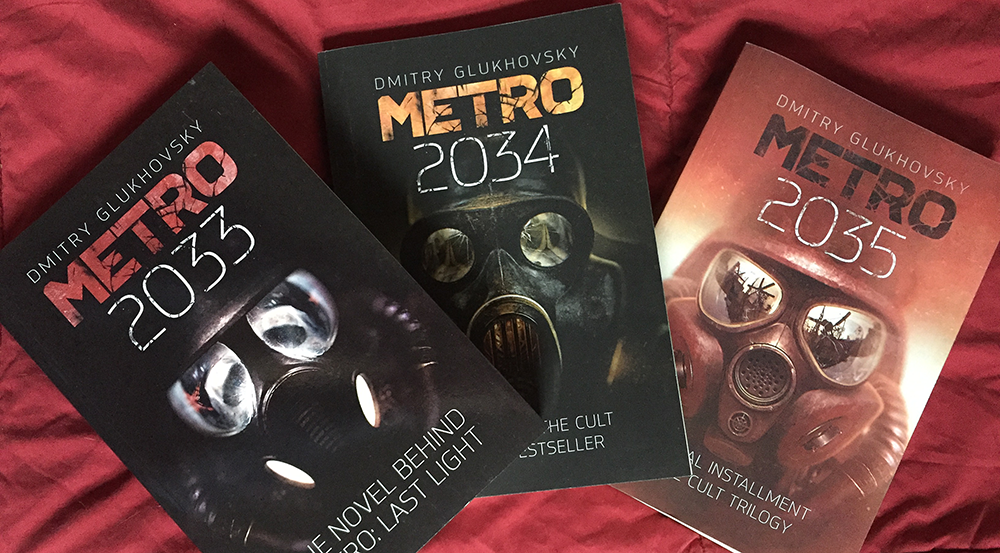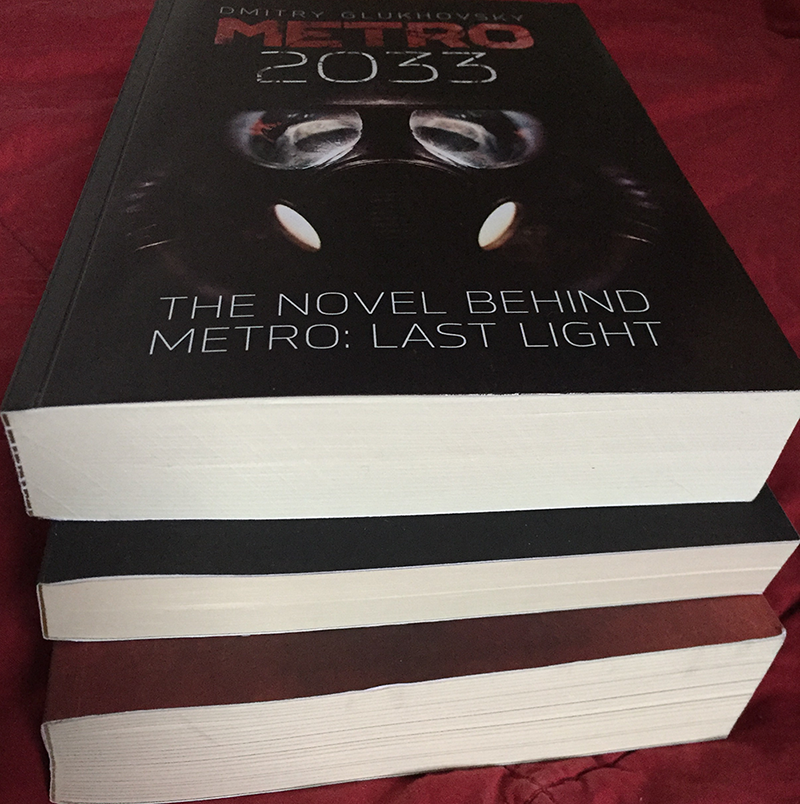The story
Metro 2033 (Метро 2033) tells the story of the 40,000 survivors who escaped to the subway tunnels of the Metro beneath Moscow when nuclear conflict escalated to war between Russia and the United States in 2018. For the survivors, life went on, in a fashion. Precious ammunition counts as currency in the Metro, where people live day-to-day cultivating mushrooms, tending to pigs, and defending their home stations from mutated creatures and hostile invaders from other stations on the line. Now, a new threat has arrived: Dark Ones – neither creature nor man but some strange psychic being in-between – have started to encroach on VDNKh Station. Artyom, who was only five years old when the missiles struck, and who remembers the surface world only as a vague dream, is entrusted with a dangerous mission to destroy the Dark Ones. But that means leaving VDNKh, making his way through the warring factions of the Metro, and confronting the horrors on the surface. Along the way, he will discover a secret about the Dark Ones that could change the course of humanity forever.

My ‘Metro 2033’ collection of novels.
First published online by young Russian writer Dmitry Glukhovsky in 2002, Metro 2033 was followed by Metro 2034 in 2009, and Metro 2035 in 2015. A videogame adaptation of the first book came in 2010 from developer 4A Games, which, admittedly, was my introduction to the series, with a follow-up sequel in 2013. [If you are only familiar with the game/s, but you liked the world presented there, and if you’re dedicated enough to make it through some dense Russian fiction, I recommend the books.]
While the author was born and the books themselves take place well after the Cold War, all three include critical – at times even damning – observations on communism and fascism. These two ideologies are on display throughout the books as the primary warring factions, the Reds and the Fourth Reich. A third group, Hansa, is a free trade coalition, while the sub-stations that comprise Polis at the center of the Metro map represent a kind of intellectual oligarchy. Artyom’s interactions with all of these small nation-states (nation-stations?) form the backdrop of the Metro’s bleak survivalist landscape.
My feelings
I’ve just finished reading the third book, but I could almost go back and re-read all three of them again right away. Not because they’re great masterpieces, but because I simply felt for this story, both on the page and beyond it. I’ve seen a lot of frightening similarities to the “old Moscow” told in these books to the current world in which we live, and I hope we don’t make the same mistakes the killers and the survivors in these books do.
The first book is definitely a freshman work; Glukhovsky wrote it when he was only eighteen. The reader – especially a non-Russian-reading one – will feel the lack of a professional editor. The text is also incredibly dense, with long passages of history and exposition. But, the world and the characters of the Metro are so damn compelling, and the situation so close to the reality we’re experiencing today, that I was willing to forgive the writerly missteps, and just enjoyed being swept along Artyom’s journey through this speculative-future-Moscow and its subterranean tunnels. The second book (Metro 2034) is more polished, with fewer characters and tighter story arcs; the third (Metro 2035) even more so. There’s something about that first book, though, that really spoke to me. The characters feel like people one could actually meet in this bleak, nihilistic situation. Each man (the cast is overwhelmingly dominated by men) has his own story. Some of them, like the Marxist Revolutionaries, we glimpse only for a few pages; others, like the young Brahmin who befriends Artyom in the sprawling Library station, we grow to care about. They all have their own goals, fears, and conflicts, and create a greater world with their individual stories.

These books are not short. My edition of Metro 2033 clocks in at 460 pages; Metro 2034 runs 283 pages; Metro 2035 is a whopping 496 pages. A professional editor would, no doubt, carve out a lot of the characters and scenes, for reasons of time and space. But I’m glad they got to stay intact in the author’s vision. The books would definitely feel lesser for their loss.
Inspiration from Metro 2033
I’ve always enjoyed speculative and science fiction, though most of my long-standing favorites are farther flung in time than the world of Metro 2033. And, much of my pleasure reading over the last few years has centered firmly around detective fiction. But I had a great time reading these books; I’m glad that the recent bundle sale of the games prompted me to look up the story that inspired them, and I’m grateful to have read a young author’s journey through a world of his own making.
Glukhovsky published the first book online, on his personal website, for free. No editor, no publisher; the book distribution came three years later, after it had already been read by thousands of people in Russia and overseas. It gives me hope that there are still people – “regular” readers – who are willing to take a chance on something new, something different, something personal that doesn’t necessarily have the stamp of a big-name publishing company on it. Hope for me as a writer…and for me as a person in the real world who doesn’t want to live someplace like the Metro.
If any of you have read these books, let me know! I’m dying to talk about them with somebody. 🙂

This isn’t something I’d normally read, but it sounds interesting! I’m finishing up an indie thriller now and next up is “Women of the Silk” by Gail Tsukiyama. That’s one of the books recommended to me from that tweet I recently sent out. I added it–as well as the ones you recommended–to my TBR list. 🙂
Glad to hear you got some good recommendations from that tweet request, Carrie. Women of the Silk sounds interesting – I’ll have to recommend that to my sister, too!
Grim dystopian spec-fiction is not usually my thing, either; generally, I prefer more straight-up adventure sci-fi, like the John Carter series. But these books are just full of so many individual interesting stories…! A lot of the imagery in those stories still haunts me weeks later. I will say that the first book in particular took some diligence to get through. The first two-thirds of the book, while stuffed with some very fun characterizations (the Bourbon and Khan characters really stand out), felt very slow – I could only do about one chapter per sitting. The last third is kind of a whirlwind, though: I was breezing through two and three chapters at a time. It felt like the author was free-writing the early chapters, with a vague idea of, “The hero needs to get to X,” and just tossing in whatever felt fun or interesting at any given juncture. Kind of unstructured…but that also made it feel more of an organic journey to me, too.
Whatever you read next, hope you enjoy!
Thanks!
I’ve definitely enjoyed the games, though I haven’t read the books yet. Might have to add these to my shelf. If a Russian can write one thing well, its suffering and a grim reality.
I recently discovered the “Year’s Best Science Fiction and Fantasy” short story collections that are published every year, so I’ve been catching up on those. There’s just so much imagination in there that there’s something for everyone. And who knows, some of the tricks it takes to build a whole world in ten pages or less might just rub off on me.
Thanks, shade! This world and characters have grabbed me enough to write at least one short story around them. I’m really enjoying doing that. Plus, researching Russian folk tales and monuments has been a lot of fun!
Wow, I used to get that World’s Best book when I was a teen! It’s great that it’s still published. Yes, there’s so much out there, so many new and engaging ideas people are sharing.
Reading is one of the best how-to techniques around; I learn so much when I read someone’s work where the pure joy of the craft is allowed to shine through.
I totally think you could create a world in ten or fifteen pages! When it works best for me as a reader is when the characters really live in their world. Using language and dialogue and action not to explain but to put people in a specific time and place, where their lives affect and are affected by the world around them. Immersion. That’s what it’s called. 🙂
I haven’t read any speculative fiction books all the way through. I think it’s because I’ve been spoiled by TV, movies, and video games. I’m expecting action from the get-go, not worrying about a lot of world-building. I like the premises of some of the books I’ve heard. I need to keep an open mind and have an understanding when I read them that good world-building is essential to these genres. I may try my hand at reading one of these books again. It’s just a matter of finding one that appeals to me the most.
Sounds like a really interesting read. I’m reading Audrey Kalman’s book which comes out today! I’m sticking with YA for the next month while I work on line edits of my YA book. Then I’ll fit in some thrillers and mysteries by author buddies. 🙂
I think world-building is necessary in any genre or story, personally – it’s all in the way the author approaches it. Spec-fic or sci-fi or fantasy have an undue pressure put on them for that aspect…but I’ve read a lot of enjoyable stories in each of these genres where there’s just enough world-building to get the reader up to speed, and then it’s, “Away we go!”
The Metro 2033 series spent a lot of the first volume in world-building, that’s true, but it was very compelling social science stuff, to look at a more-or-less modern-day Russian society, with all its micro-factions vying for supremacy: capitalists, communists, fascists, and then at the bottom the refugees just trying to scrape by. This is not an easy book/series to recommend to everyone, because it is so dense…but I really enjoyed reading every page of it.
I’d say that, if you find a premise that looks interesting, give the book a chapter or maybe even two to hook you. If it can’t do that in two chapters, best to move on. But if you see a glimmer of something there that interests you, it might just be worth the effort of seeing it through.
I really enjoyed these books…but I can appreciate that not everyone would. It’s a lot of text with a lot of socio-political commentary under the surface, much of it relating to present-day Russia. It’s also a speculative-fiction adventure story, which a lot of people might pooh-pooh as pulpy. It was so fascinating and empowering to actually see an author maturing through each successive chapter, though, like I was along for the ride as he was getting better, page by page.
I went back to detective thrillers after I finished these books…but those characters are still lingering with me. One of the great things about books is how some of them touch us in that way. 🙂